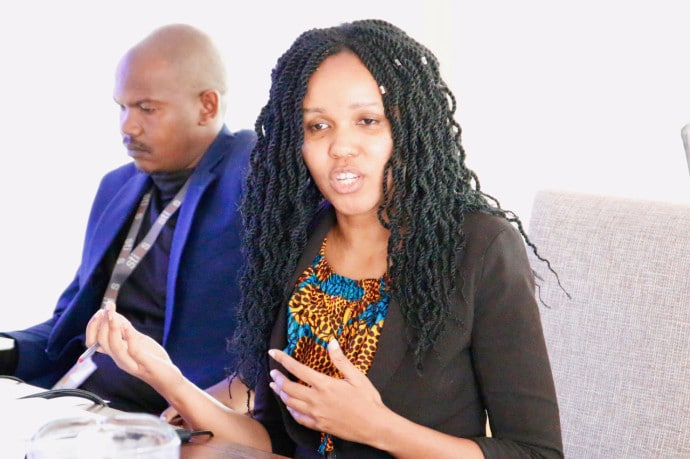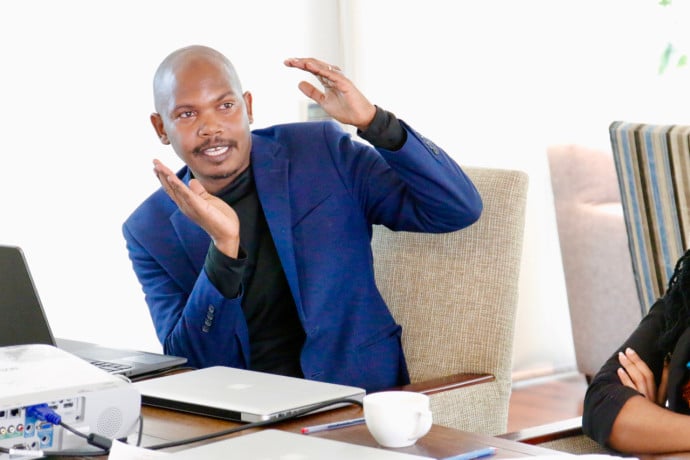The law of commissions – a comparative study of the place of commissions in law and governance
“Commissions have come to occupy a central place in law and governance particularly in Africa. However, they are often seen as an indication that the government has no intention of doing anything about the problem and wishes to buy time. In some African countries – including South Africa – there are so many commissions active at any one time that it’s almost necessary to question whether we need a commission to study commissions,” said visiting scholar Nkatha Kabira of the School of Law, University of Nairobi. Kabira was highlighting her project which is exploring the role of Commissions; interrogating Commission discourses; examining the power of Commissions and their place in law and governance; and, investigating global developments of their legal and socio-political dimensions.

Kabira is quick to point out that she is approaching this from a holistic approach that probes and unpacks Commissions in all their complexity. “We need to step out of the river to contemplate its current,” she said. “The work is premised on my claim that Commissions are a distinct form of law and governance that exercise power by mediating between law and facts, state and civil society; negotiate between conflicting community and individual interests; and, address a range of political, social and legal issues.
“I think we are a commission-weary society in many African countries – asking whether a president is really a president without a commission,” she added. “This is a favoured tool of governments but no one has done a comparative study to examine why.”
“Commissions in Africa have been used to address a range of contentious issues like land ownership, representation, gender, Constitutional review, administration of justice, individual versus community rights, democracy versus national unity, and ethnic and national identities.”
Whose truth is the truth?
Using examples from commissions in Kenya formed to address issues of ethnic violence and land claims, Kabira pointed to the different methodologies and tools used and their varying levels of success. In particular she compared the more formalistic legal approach with methods based on a more interdisciplinary, less formal, community participative approach.
“Some of the Commissions have used a formalistic approach – what I refer to as an African British legal model – interpreting their mandate, procedures and tools by applying a formal vision of law and land ownership based on who owns the title deed devoid of the deeply rooted social and political realities.”
“These formalist tools left many questions unanswered.”
“The study illustrates that more flexibility in form allows for more creativity,” she said. “Such flexibility challenges traditional understanding of law and governance, and generates more innovative solutions.”
“Legal scholars must adjust to changing realities and embrace Africa’s legal thought,” she continued. “There is a discrepancy between textbook law and what is going on in reality.”
“We have had the dominance of German, French and American legal thought. It may now be time to speak of African legal thought. I’m hoping that my work will help to open this conversation and be a catalyst for more innovative discussions to understand African problems in a more innovative way.”
Legal protection of the land rights of hunter-gatherer groups
“Africa is home to the remaining ‘hunter-gatherers’, traditional communities that make a living predominantly through collecting wild fruits and hunting wild animals,” said Elifuraha Isaya Laltaika of the Faculty of Law, Tumaini University, Makumira. “These communities depend on land and natural resources for their physical and cultural survival.”

“Common features include communal land stewardship and a deeply felt spiritual and emotional nexus with the earth. However, they lack robust legal protection of their ancestral lands, partly because most governments regard hunting and gathering to be at variance with the dominant development paradigms and market forces. International human rights standards and the indigenous peoples’ rubric these communities resort to, face stiff resistance from policy makers, and conflicting views from scholars.”
“Human rights law is largely modelled along protection of individual rights. Yet the economic viability, culture, religion and development of these communities depend on securing their communally owned land and natural resources.”
“The Sustainable Development Goals have renewed interest in human rights of communities in the margins,” he continued. “Every country is challenged to address exclusion and poverty within their borders and to ensure that no one is left behind.”
“Hunter-gatherers are a particularly vulnerable group,” he added.
Using the SDG’s emphasis on ensuring human rights for all as the pigeonhole, Laltaika hopes to address the paucity of legal literature specifically on hunter-gatherers’ collective land rights as well as examining appropriate legal tools to address the issues relevant to this unique group. He hopes to look at the impact of trans-national and trans-local law and to discuss law as an enabling institution which is “not one size fits all”.
“I believe the hunter gatherer communities deserve equal treatment before the SDGs expire.”
“Law is not a magic bullet,” he said. “There is too much emphasis on court processes and procedural methodology. The law is very constraining – for example, evidence may not qualify as evidence in terms of the rules – this means useful information is locked out of the process.”
“We tend to think if a situation cannot be fixed by Western law it isn’t important. We have to interrogate how legal precedent fits into the local context and realities. We need more decentred, multi-disciplinary and multi-methodological processes when it comes to dealing with the rights of indigenous peoples.”
“Indigenous peoples should not have to prove that they deserve rights. I hope this project can draw attention to alternative tools to the problem of exclusion to the robust land rights of hunter-gatherers,” he added.
Speaking more generally about Africa and what is African, Laltaika pointed out that it is important to stop seeing Africa as a monolithic entity. “It is very different from Cape to Cairo,” he said. “We must escape this view of Africa. In law you have the general rules and exceptions – it’s time for more consideration of the exceptions.”
Michelle Galloway: Part-time media officer at STIAS
Photographs: Christoff Pauw
